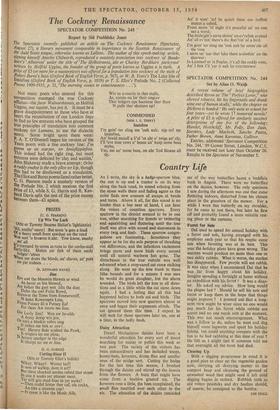The Spectator recently published an article on The Cockney Renaissance
(Spectator, August 27), a literary movement comparable in importance to the Scottish Renaissance of the Auld Scots tongue, otherwise known as Lallans. The author of this epoch-making article, signing himself Anselm Chihvorth, reproduced a masterly translation into cockney Of Baude- iaire's Albatross' under the title of 'The Helbatrawss, aht er Charley Bordilairs parleyvoo' written by Helfrid Uggins, the founder of the group of poets known as Uggins n is mob. A prize of £5 (or more for a masterpiece) was offered for a translation into cockney of the mob of Robert Burns's Jean (Oxford Book of English Verse, p. 567), or W. B. Yeats's The Lake Isle of Itinisfree (Oxford Book of English Verse, p. 1039) or T. S. Eliot's Prelude No. 2 (Collected Poems 1909-1935, p. 21, The morning comes to consciousness . . .').
Not many poets who entered for this competition managed the true Cockney afflatus—the furor Walworthiensis, as Helfrid Uggins, our master, has put it. It must be a grave disappointment to those who have at heart the resuscitation of our London 'Pig° to find so few entrants who have grasped the true principles of translation into common Cockney (or Lunnans, to use the dialectic t MI). Some bright spots there were:• _e re A. T. O'Donnell began his version of the Yeats poem with a fine cockney line: I'm Vilna up an scarper, ter hmisflippinfree. This indeed had the right ring, but most entrants were defeated by 'clay and wattles.' John Blakeway made a brave attempt: Orlvo a ruddy enahse is the only plice ter kip, though this had to be disallowed as a translation. The Eliot and Burns poems fared rather better. C. G. Pearson made a masterly version of the Prelude No. 2 which receives the first Prize of £3, while S. G. Harris and R. Ken- nard Davis split the rest of the prize money between them—el apiece.
PRIZES
(C. G. PEARSON)
Up Wiv Ver Lark
(Aht et Tommy Steams Heliot's 'Ighfalutin) 'Ail, smilin; mornl But soon 'e gets a load beery smell from sawdust on the road wot sort 'o breaves it aht. Yew know, mushy an' all
It's tramped by coves as runs to the corfee-stall Early-like. Makes yer fink of them seedy
When yer When yer drors the blinds, an' shaves, an' puts on yer trahses. . . .
(it. KENNARD DAVIS)
Mae Ery awl the bloomin blawsts er wind As hever as bin blowed, Aw loikes the gust wot lifts the dust Dahn the owl Fuim Rowd, Ercrorst the Tems from Emmersmiff,
N dahn Rowemn Li, From Putney Ill n Putney Eat Fer there Aw meets me Jim.
Ow Luvly Jine! Wen aw be-olds A dycsy demo wiv jew, Or ears a blinkin robin sing It mikes me fink er yew I _ Yus Hevery flahr arahnd the Pawk, It wispers ter me pline, N hevery spadger in the edge It chums ter me er Jine.
(S. G. HARRIS)
Curting-Riser II (Aht er Tommy Eliot's ladida) Wikey, Wikeyl Wotter lad!
It urns of wallop, dont it art'?
But thive chucked sordus rahnd ther street
In else it soaks yer pliteser meat. Yer still gits mud froo to yer socks?
—Then crand hinter ther caf, ole cocks,
Wiv us a-roarin in ther stalls, As, comin on fer their ongcor
Ther lodgers ops hacrorse ther floor N pulls ther shutters upl COMMENDED
(MISS J. E. TERRY)
Innisfree I'm goin' ter sling me 'ook nah: nip orf ter lnnisfree, An' biwid meself a li'ul 'ut aht o' twigs an' cly, I'll save nine rows o' beans an' keep some bees mybe, Yus, me an' some bees, on ahr Tod Sloane all dy. From morn 'til night it's peaceful an' no one sez a word;
The midnight's sorta shinin' on ev'ryfink arahnd An' all ev'nin' there's the flutt'rin' of a bird.
I'm goin' ter sling me 'ook nah fer some'ahr all the time
I seem ter 'ear that lake there a-sloshin' on the shorwer : In Lambert' or in Poplar, it's all the ruddy sime, An' 1 fink I'll 'ear it nah fer cvermorwer.


































 Previous page
Previous page